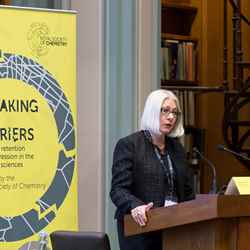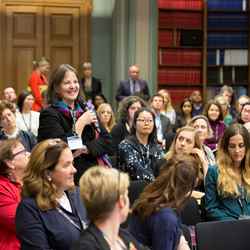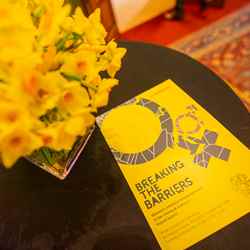Time to break the barriers
The launch of our new report on issues surrounding retention and progression of women in the chemical sciences featured lively discussion and powerful reflection, with a unanimous call for action.
Our Breaking the barriers report, published on 6 November, explores issues such as poor management culture, prevalence of short-term funding and lack of work-life balance, with 99% of female chemists in UK academia evidencing poor retention and progression of women. It also uncovers evidence of widespread bullying and harassment.
“We don't want gender equality to become a target, the focus is to hold on to talented people and create a working environment that allows everyone to achieve their potential,” said our president Professor Dame Carol Robinson as she opened the evening’s launch event, at our London headquarters in Piccadilly.
Vicky Ford MP then gave an impassioned introduction, thanking the Royal Society of Chemistry for an “excellent and ground-breaking report”. As the first woman to represent the constituency of Chelmsford in the House of Commons, Vicky Ford reminded the audience that “It is an incredibly important year for women in politics: it's 100 years since women first got the vote, and two weeks' tomorrow, we'll be celebrating 100 years since women first won the right stand for parliament.”
Detail and depth
Ms Ford also touched on some of the report’s findings, highlighting that “Academic funding is so often skewed towards those who have published recent papers. So if you take a career break to be a mum or a carer for an elderly relative or another reason, then you find yourself quickly cut out of opportunities to get that next bit of grant funding.
"Looking at ways you can improve the funding structures to be more supportive, as well as looking at ways to address issues with harassment and bullying, are absolutely key. And that's why I was so pleased to read the detail and depth of this report.”
She also thanked us for our prompt response to the recent budget, which emphasised the need for government funding to support fundamental research as well as applied science.
“We are today a world-leading innovative country,” said Ms Ford. “And if we want to continue to be that world leading innovative country, then we need to continue to invest in science and technology and we need to make absolutely sure that both men and women feel that they can play a part in science and technology.”
Power, biases and slowing down science
A panel discussion of the research, chaired by Dame Carol Robinson, led to lively discourse on a variety of issues, including departmental “gate-keeping” that denies women opportunities to apply for competitive research funding; unfair and opaque recruitment processes; and the problem of intersectionality, compounding barriers faced by minority groups.
“Being a minority is not just about population parity,” said Dr Karen Salt from the University of Nottingham and deputy chair of UKRI’s Diversity Advisory Committee. “It’s about power, and how much power you wield in certain spaces.
“We have a whole track of work around ethnicity and race, and an incredible amount of work looking at gender, but what happens when those two spaces overlap?”
Professor Randall Peterson, director of the Leadership Institute at the London Business School, talked about the risks of unconscious bias: “When you’re recruiting for leadership positions you need to have very clear criteria on the qualifications, experience and skills needed, and not leave room for the mysterious quality of ‘fit’. ‘Fit’ means someone like you that you’re comfortable with.”
Professor Uta Frith from University College London and chair of the Royal Society’s Diversity Committee proposed the idea of supporting ‘slow science’ – encouraging scientists to think more about the quality of their research output by capping the number of papers academics are allowed to publish per year.
Fixing the pipe, not the water
In response to the issues raised in the report, the Royal Society of Chemistry is launching a five-point action plan, including introducing a bullying and harassment helpline in the summer of 2019, and creating a grants scheme to help those with caring responsibilities attend meetings and events essential for their career progression.
“In part, some of the narrative isn’t new,” said Kevin Coutinho, member of our inclusion and diversity committee and Vice-Chair of the Higher Education Race Action Group. “We heard Carol Robinson speak about the fact that 20-25 years ago the data doesn’t seem to have changed very much, and I think that’s the important message. We’ve tried a number of different interventions to do things incrementally, so we now need to think about what we can do to highlight and catalyse change.”
As well as introducing our own actions, our report also calls on funders to better balance short- and long-term funding structures, and academic institutions to introduce or enforce policies that lay the foundations for a fair and healthy working culture.
“We talk often about the leaky pipeline,” says Kevin Coutinho, “But if you have a leaky pipe, you don’t change the water, you change the pipe.”
You can read the full report and download a digital pack of resources to help us promote the findings on our website.
Press office
- Tel:
- +44 (0) 20 7440 3351
- Email:
- Send us an email








